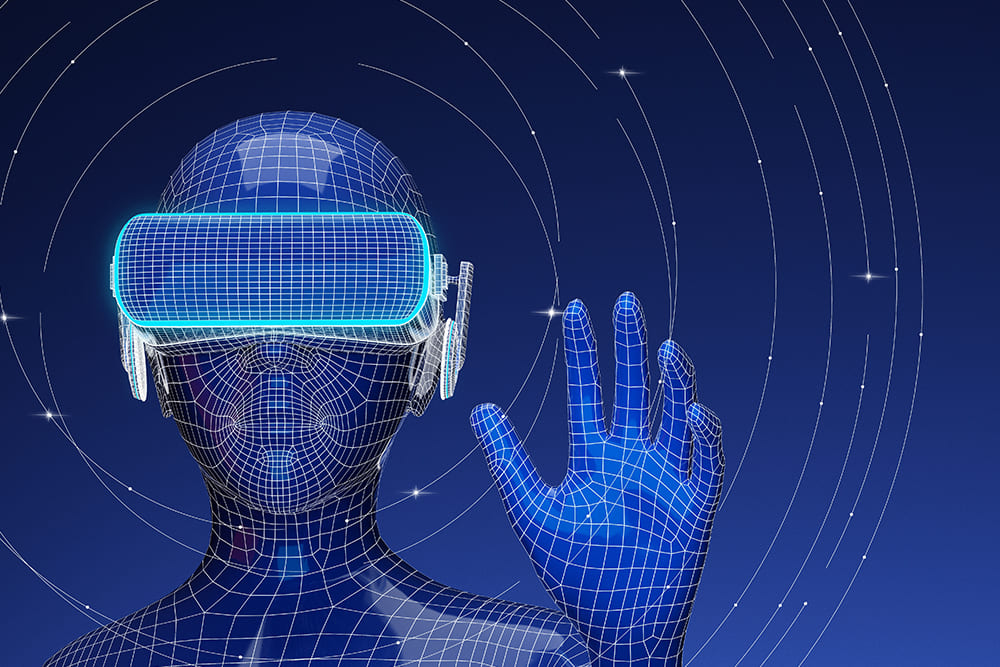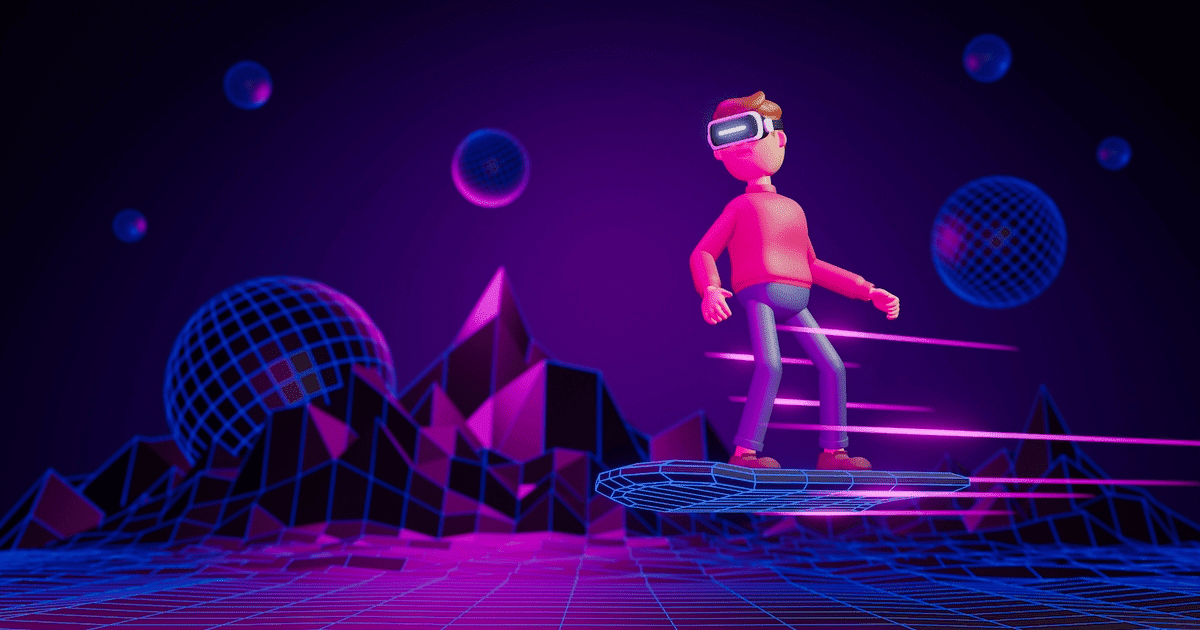How Could Metaverse Be a Game Changer for the Virtual Gaming Industry?


How Could Metaverse Be a Game Changer for the Virtual Gaming Industry?
The innovative notion of the metaverse—a combination of virtual reality (VR), augmented reality (AR), and the internet—has recently surfaced as an idea that has the potential to completely transform the video gaming industry.
- What Is Gaming in the Metaverse?
- Metaverse vs. Traditional Virtual Gaming
- What Effect Does It Have on the Industry?
- Types of Metaverse Gaming
- The Essential Features
- Technologies That Power Metaverse Gaming
- Unresolved Problems in the Video Game Multiverse
- Popular Companies
- Video Game Examples
- Does the Future of Gaming Lie in Virtual Worlds?
- How Can EvaCodes Help You with Metaverse Development?
- Conclusion
What Is Gaming in the Metaverse?
The innovative notion of the metaverse—a combination of virtual reality (VR), augmented reality (AR), and the internet—has recently surfaced as an idea that has the potential to completely transform the video gaming industry. This permanent digital realm provides opportunities for unparalleled interactive and immersive experiences. This article will delve into the complexities of gaming in the metaverse, investigating the development of gaming, its technical foundations, and the future opportunities it presents.
Metaverse vs. Traditional Virtual Gaming
Since its inception, gaming has gone through a period of remarkable development. The industry has come a long way, from the days of pixelated console adventures and rudimentary arcade games to high-definition visuals and sophisticated online multiplayer experiences. The emergence of the metaverse is the next step in the development of game technology, as it enables players to experience a level of engagement and immersion in virtual worlds previously unattainable.
What Effect Does It Have on the Industry?
The metaverse fascinates its users by making them feel as though they have stepped into a brand new world. This may catch their curiosity enough to keep them engaged, providing them with a three-dimensional space in which they can interact closely with their surroundings.
Metaverse users can also learn, communicate with others, work, earn money, and even virtually attend meetings and concerts through non-fungible token (NFT) trading and live game streaming, all while immersed in an otherworldly experience.
Types of Metaverse Gaming
One day there may be just one metaverse linking everything together. Currently, every game produces its very own metaverse, which players can enter through the internet. The creators have complete control over its appearance and function. Based on the architecture of the game, metaverse gaming can be classified as one of the following main types:
Traditional centralized metaverse
Instead of incorporating blockchain technology into its infrastructure, the traditional centralized metaverse relies on a centralized framework to conduct its operations. These virtual worlds are operated and maintained by organizations, which do so by monitoring the data and activities of users. Roblox, Minecraft, and Fortnite are a few popular examples of this type of game.
Centralized blockchain metaverse
Users of a blockchain metaverse can employ NFTs and other digital assets to trade with one another and build their own economies inside the community. This type of virtual environment is known as a blockchain metaverse. Two excellent illustrations of this kind of metaverse are Earth 2 and the virtual world that Meta is working so hard to create.
Decentralized blockchain metaverse
These platforms aim to establish a community dynamic characterized by an equitable distribution of authority. Such metaverses use the “play-to-earn” philosophy, even though centralized blockchain metaverses have as their ultimate goal the distribution of wealth from the top down. Users gain economic and political power as a result. Axie Infinity and Decentraland are two examples that come to mind.


Expert Metaverse Game Development
We build decentralized applications and smart contracts for a variety of uses.
The Essential Features
Gaming in the metaverse can potentially change many different facets of activities in a virtual setting. Metaverse, which replicates the real world, does not call for any specialized hardware like headsets and has the potential to expand into far more game subgenres than AR and VR.
Social gaming
The metaverse is essentially social and offers players a social setting where they can form relationships with the components around them. Because players will be able to invite friends from the real world, they can interact with other players, build relationships, and so on. This will give multi-player gaming an additional dimension.
Play-to-earn games
One of the most important aspects of gaming in the metaverse is the presence of play-to-earn. In addition to obeying the rules and linear storytelling, players have the opportunity to engage in profitable activities. Trading activities—such as selling in-game assets to other players for the sake of metaverse-based cryptocurrency gaming—can also be a part of these games.
Flexible gaming experience
The gaming experience is significantly more adaptable and immersive. You can quickly add participants to the virtual world, develop content, establish sub-games within a game, and treat the gaming environment as a platform where other activities can take place.
Portable game assets
The asset portability feature may become possible due to the interoperable design of the metaverse. The regulations determining permanent ownership would be governed by NFT, and portable ownership of weapons or avatar modifications obtained in one game may be taken to another environment.
Mixed reality experience
The metaverse creates a more natural experience by combining AR and mixed reality (MR) technologies. MR could end up being included in gaming in the metaverse. In this scenario, users would go fluidly from interacting with an AR group text to playing an MR board game to entering a full-fledged VR world in the metaverse.
Technologies That Power Metaverse Gaming
Gaming in the metaverse is enabled by a wide variety of cutting-edge technologies, all of which contribute to developing immersive and participatory gaming experiences. The following are examples of some of the key technologies that underpin metaverse gaming:
- Augmented reality (AR) and virtual reality (VR) are the two technologies that deliver a fully immersive experience to gamers by generating a 3D world that is interactive and entertaining. These environments are created using AR and VR technology.
- Blockchain technology establishes a safe and transparent system for the exchange of virtual assets in metaverse gaming. Because of this, gamers are given the opportunity to purchase, sell, and trade virtual objects via metaverse cryptocurrency, a form of digital cash that is exclusive to the metaverse.
- The technology behind IoT connects the digital and physical worlds, paving the way for the creation of real-world gaming experiences that are seamlessly integrated with virtual ones. For instance, IoT devices can be used to monitor players’ location in real time, which can then be used to provide in-game activities or events.
- The technology of 3D reconstruction is used to generate 3D models of the virtual environments used in metaverse games that are of high quality and have a high level of realism. This makes it possible to have game experiences that are more realistic and immersive, in addition to having better graphics and more accurate physics simulations.
Unresolved Problems in the Video Game Multiverse
The potential security risks are not only a challenge; tremendous opportunities can also be gained by overcoming them. A few obstacles need to be cleared up before realizing the full potential of the metaverse. The gaming metaverse is a digital area that allows the upload of huge amounts of data but is extremely susceptible to hacking and other forms of cybercrime.
Data security
Companies in the gaming industry will need to take precautions to protect their massive data from cybercriminals as more and more players utilize the metaverse to create personalized gaming experiences.
Gamers are faithful to companies they view as trustworthy, secure, and open. This demonstrates the importance of investing in cybersecurity in order to provide a personalized gaming experience for each customer and maintain brand loyalty.
Unsure of how to incorporate NFTs into gaming
When it comes to video games, NFTs can take the form of digital assets that players can possess within their virtual universe and serve as a foundation for the metaverse economy.
According to the EY US report, gaming executives believe that a greater emphasis on NFTs increases consumer satisfaction, profits, and brand recognition.
Managing user data
When game developers ramp up their search for metaverse opportunities, they frequently find themselves inundated with user data. To keep your sensitive data safe from hackers, gaming companies need staff data analytics and cybersecurity experts.
Find a professional who is familiar with the ramifications of decentralized and distributed ecosystems to solve the problem in a timely manner.
Control child-appropriate services and controls
It can be challenging for gamers to keep an eye on their children and disclose any online games with extensive avatar customization. Video game developers have a responsibility to provide kid-friendly titles with acceptable content and age restrictions.
Infrastructure breach
Companies in the gaming metaverse face significant difficulty in the lack of interoperability and standardization among the various gaming platforms present in the metaverse.
The gaming industry has not yet attained the kind of huge-scale interoperability necessary to construct a game in the metaverse. There is still a long way to go in terms of both the development of our technology and the cooperation between IT giants and patent holders.
Popular Companies
Large sums are spent on developing, designing, and commercializing metaverse platforms and applications by well-known firms and institutions. These businesses are in an excellent position to pioneer the way into the future of metaverse gaming. If you’re looking for a job in this industry, they’re also a great place to find openings.
- Decentraland
- Sandbox
- Epic Games
- Meta (Facebook)
- Microsoft
- Roblox
- Niantic
Video Game Examples
If you are considering making a career out of metaverse gaming, one of the first things you should do is educate yourself on the most prominent companies in the field.
Alien Worlds
Alien Worlds is a play-to-earn video game showcasing a metaverse of six different worlds. There are five hundred individual plots of land available in each globe of the game. Owning land, engaging in mining, or using the Binance Smart Chain are all viable options for acquiring “trilium” tokens. Achieving accomplishments and making progress in the game grants players the ability to store and eventually sell in-game material.
Axie Infinity
This game, released in 2018, is based on Pokémon and allows players to collect, trade, breed, and raise Axies. These fantastical animals can reproduce, and you have access to more than 500 body parts to personalize your Axie. Blockchain technology is used to power this popular NFT game.
Chain of Alliance
Chain of Alliance is a role-playing strategy game that allows players to personalize their monsters and build teams with up to eight different characters for each round. The game features aspects from fantasy and science fiction, allowing users to go on quests and engage in combat using their own customized NFT avatars and unique in-game goods.
Decentraland
The business behind Decentraland, a virtual realm run on blockchain technology, claims to be an industry pioneer. Players in this metaverse game have the freedom to build and control their own online playgrounds. In this one-of-a-kind virtual marketplace, users can trade virtual goods, play games, and find other services and goods that can be exchanged for real money.
My Neighbor Alice
Own and cultivate virtual farming plots or islands with the help of Alice in the popular multiplayer game My Neighbor Alice. Like in Farmville, the player can choose what kinds of crops to cultivate, what types of animals to breed, and how to connect with other players.
Farmers World
In the online game Farmers World, you can farm, mine, and produce various resources, including food, timber, and gold. Obtain NFT land plots by trading for them in the game’s marketplace and then use those plots to explore and harvest materials from the land. There is no overarching narrative to pursue like in other metaverse games. Instead, it is designed with an Amazonian society, constructed by mining for gold, collecting fish, breeding NFT animals, and chopping wood.
Krystopia
Krystopia is a Chromia blockchain-based game that combines puzzles with adventures. If you enjoy mazes and other puzzles, you might love playing this game. While exploring a mysterious realm rich in treasure and secrets, you will have the opportunity to explore and solve puzzles. This video game has an in-game economy, and players are rewarded for their victories with in-game currency.
Sandbox
Sandbox is a free, open-source game developed on Ethereum architecture. It grants you ownership of land that is kept as an NFT. You can develop unique locations, come up with game ideas, and even monetize your land so you can benefit from other people visiting it.
Pokémon Go
It’s safe to say that Pokémon Go is one of the most famous AR games ever made, and it’s certainly the model for other metaverse games like Axie Infinity. NFT Pokémon cards are digital assets that can be purchased, and they are backed by real physical cards. These cards are currently being “minted” on the blockchain, where they may be acquired or sold as NFTs.
Does the Future of Gaming Lie in Virtual Worlds?
Although it is impossible to predict what will happen in the future, it may be said that the metaverse will likely disrupt the gaming industry. It provides 360-degree perspectives and immersive games, enabling users to create their own virtual places and enjoy various activities such as concerts, sports, and social connections within those spaces. As the metaverse expands, its influence will almost certainly have a ripple effect throughout the gaming industry. As a result, an increasing number of gamers will yearn for environments that are truly immersive.
How Can EvaCodes Help You with Metaverse Development?
EvaCodes is a pioneering firm in the development of the metaverse, with years of experience under its belt in the construction of immersive apps. The group of professionals in the metaverse that we have here can act as a reliable partner in the software development services offered for the metaverse. With their assistance, get your project off the ground and find success. Our range of metaverse development services includes:
- Metaverse application development
- Metaverse game development
- Metaverse NFT Marketplace development
- Interactive services provided by the metaverse
- Metaverse social media app development
Get in touch with our team of technical advisors so we can get started right away.
Conclusion
The gaming industry is receiving so much attention these days because of the value it has added to the metaverse, the value it will continue to provide, and the fantastic example it sets for other industries. We are inching our way toward a fully digital future through the medium of games. If you’ve been motivated to take action for the future of your business, contact us today! We will help you move forward with your dream.
Written by Vitaliy Basiuk
CEO & Founder at EvaCodes | Blockchain Enthusiast | Providing software development solutions in the blockchain industry





